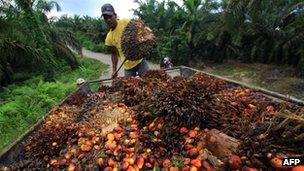Malaysia palm oil firm gambles on 'recession-proof' future
- Published
The giant reddish-brown round fruits being harvested at a palm oil plantation in the northern state of Perak are one of the cheapest available sources of vegetable oil.
It is also a central part of the world's second-biggest initial public offering (IPO) this year, second only in size to internet firm Facebook's.
Malaysian palm oil firm Felda has raised 10.4bn ringgit ($3.2bn; £2bn) by selling shares in its palm oil plantation company Felda Global Ventures (FGV).
For Malaysia, which is the world's second-largest producer of palm oil, the industry is big business with an annual turnover of $16.6bn.
Land shortage
But while demand is rising for the product - widely used in everything from biscuits to biofuel - Malaysia is running out of room to plant the oil palms from which it is extracted.
Malaysia's main roads are lined by mile after mile of plantations. Analysts estimate that at the current rate of use, Malaysia will run out of plantable land in just a few years.
That is why FGV wants to raise money to expand its business in neighbouring countries such as Indonesia, Cambodia and, hopefully once an international trade embargo is lifted, even Burma.
"We're going to grow eight times bigger in eight years," says Sabri Ahmad, group president of FGV.
The company also shrugs off concerns about the worsening investor climate and the fact that a number of other high-profile IPOs have been shelved in Asia, such as the ones planned by high-end jewellery firm Graff and Manchester United Football Club.
Mr Sabri tells me that the food business is recession-proof and that China and India, rather than Europe and the US, are central to the firm's growth plans.
Opposition from within
Palm oil, though, is a controversial product that environmental activists claim leads to deforestation and the unnecessary and illegal culling of orang-utans.
Unsurprisingly, the FGV share sale is facing some vocal opposition.
However, rather than environmentalists, it is actually many of the company's smallholder farmers leading the calls for it to be delayed.

Demand for palm oil has been increasing, especially from India and China
Selamat Rakio is the chief of a village called Sungai Tengi in Selangor state which was created by FGV.
The 66-year-old came to the settlement in 1972 with no home of his own or job prospects.
At the time, he was given free land on which he could cultivate oil palm trees and build himself a home.
Today, he runs his own plantation and drives a Mercedes Benz car. He earns 4,000 ringit ($1,250; £800) a month: a wage that is on a par with a middle-management job in the city.
He also receives aid and perks from Felda, including scholarships for his children.
Mr Selamat is not alone in getting a helping hand.
Currently there are 112,635 Felda settlers living in villages like Sungai Tengi, and across much of the country fruit orchards and spacious homes have replaced what used to be dense jungle.
Fear of unknown
But while the past 40 years have been good for settlers such as Mr Selamat, he now worries that the share sale will make things worse.
"Everything is vague," he says. "No attempts have been made by the authorities to explain clearly to us what the listing means for us settlers."
Helping Mr Selamat and other concerned Felda settlers is the government's political opposition.
"There is great uncertainty for these people, whether they will continue or their children will continue owning the land," says Khalid Jaafar from the Parti Keadilan Rakyat (People's Justice Party).
Mr Khalid says this fear stems from the fact that some settlers have been victims of scams before and complain that they gave up their land title for development and were not properly compensated.
FGV blames opposition parties for turning the share sale into a political, rather than business, issue.
It says the stock market listing will benefit Felda settlers in the form of a 15,000-ringgit cash handout and that they will be given a share of the company's dividends. FGV insists that the listing will affect only its 355,000 hectares of land and not the private property of villagers.
Opposition parties remain unconvinced and are helping some settlers take legal action against the IPO. They have also called for a mass rally against the listing next month.
'Attractive' investment
Despite the opposition, it seems little can derail FGV's plans, not least because most of the backing for the sale comes from domestic institutions, including the Malaysian state pension fund.
Analysts say the prospects for palm oil are good, even though FGV announced that its profits halved during the first quarter of the year.
Demand is expected to remain strong, and the activity at Felda's palm oil mill in Besout seems to support that view.
For cash-rich investors, the IPO is an attractive offer, says Yeah Kim Leng, chief economist with financial research firm RAM Holdings.
But the real challenge, he adds, is what happens after the IPO and whether FGV can meet its new shareholders' expectations.
- Published14 June 2012